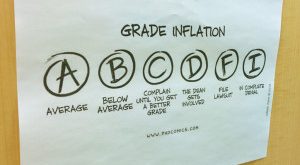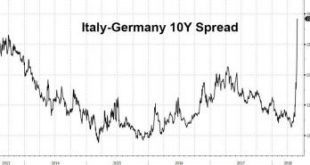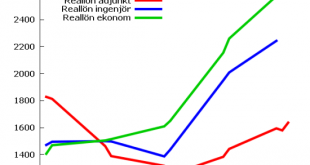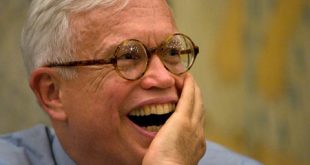For-profit schools corrupt educational systems — lessons from Sweden Neoliberals and libertarians have always provided a lot of ideologically founded ideas and ‘theories’ to underpin their Panglossian view on markets. But when they are tested against the reality they usually turn out to be wrong. The promised results are simply not to be found. And that goes for for-profit schools too. The Swedish school system has somewhat oddly combined market principles...
Read More »Anti-Blanchard
Olivier Blanchard’s intellectual path, exploring different avenues – sometimes non-linear, sometimes even contradictory – can be considered as the personification of the controversial evolution of mainstream macroeconomic research during the last three decades … Assessing this complex intellectual path, nevertheless, also helps to understand why Blanchard’s analyses are ultimately limited by the mainstream framework, and by the role he decided to play in its defense. The...
Read More »Is 0.999… = 1?
Is 0.999… = 1? What is 0.999 …, really? Is it 1? Or is it some number infinitesimally less than 1? The right answer is to unmask the question. What is 0.999 …, really? It appears to refer to a kind of sum: .9 + + 0.09 + 0.009 + 0.0009 + … But what does that mean? That pesky ellipsis is the real problem. There can be no controversy about what it means to add up two, or three, or a hundred numbers. But infinitely many? That’s a different story. In the real...
Read More »Friskolefusket — nu får det vara nog!
Friskolefusket — nu får det vara nog! The Swedish school system has somewhat oddly combined market principles such as decentralization, choice, competition, and corporate providers with an evaluation system that is highly trust-based and where teacher-set school grades are high-stakes for the students. This means that both students and schools have incentives to game a system that is easy to game and the findings suggest that the integrity of the evaluation...
Read More »Chicago economists — people who have their heads fuddled with nonsense
Chicago economists — people who have their heads fuddled with nonsense “Fisher Says Prices of Stocks Are Low,” said a headline in the New York Times on October 22, 1929, referring to economist Irving Fisher. Two days later, the stock market crashed, and by the end of November the New York Stock Exchange was down 30 percent from its peak. Fisher had based his statement on strong earnings reports, few industrial disputes, and evidence of high investment in...
Read More »Italy — shows why the euro has to be abandoned if Europe is to be saved
Italy — shows why the euro has to be abandoned if Europe is to be saved Investors had until recently been widely expected the European Central Bank to signal at its next meeting in two weeks’ time that it would wind down QE later in the year. Now, questions are growing about how feasible it will be to withdraw the ECB’s buying power at a time when investors are already driving Italian debt costs higher. Nearly half a decade ago, the Greek debt crisis turned...
Read More »Höjd lön för lärare ett måste
Höjd lön för lärare ett måste År efter år ser vi hur viljan att bli lärare minskar. I början på 1980-talet fanns det nästan åtta sökande per plats på lågstadielärarutbildningen. Idag är det inte mycket mer än en sökande per plats på grundlärarutbildningen. Enligt UKÄ har det totala antalet sökande individer till lärarutbildningar sjunkit från ht 2017 till ht 2018 med över 5 procent (för förskollärare var minskningen över 13 procent). Under höstterminen 2016...
Read More »The ultimate takedown of teflon-coated defenders of rational expectations
The ultimate takedown of teflon-coated defenders of rational expectations James Heckman, winner of the “Nobel Prize” in economics, was inteviewed by John Cassidy in 2010. What about the rational-expectations hypothesis, the other big theory associated with modern Chicago? How does that stack up now? … It became a kind of tautology that had enormously powerful policy implications, in theory. But the fact is, it didn’t have any empirical content. When Tom...
Read More »Vi bor på landet
Vi bor på landet [embedded content] Advertisements
Read More »Courage on display in Paris
Courage on display in Paris [embedded content] Courage is not anything very common, and the value we put on it is a witness to its rarity. Courage is a capability to confront fear. Courage is to do the right thing in spite of danger and fear. To keep on even if opportunities to turn back are given. Like in the great stories. The ones where people have lots of chances of turning back — but don’t. Advertisements...
Read More » Lars P. Syll
Lars P. Syll









